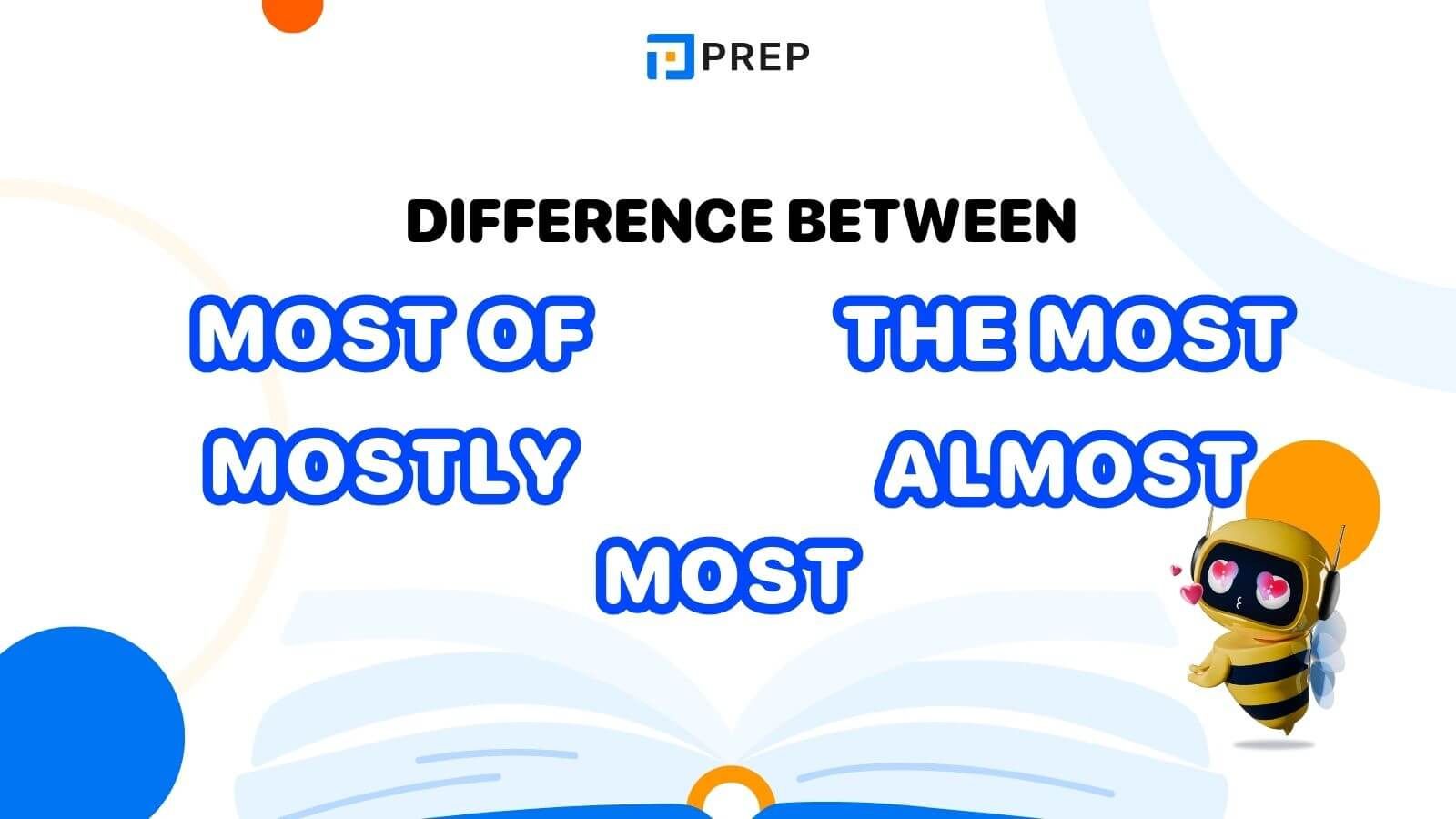Search blog
The Differences Between Most of, The Most, Mostly, Almost, and Most
"Most of," "the most," "mostly," "almost," and "most" are often confused regarding their usage. Let’s explore the differences between them below!

I. What is Most?
Before we distinguish between most of, the most, mostly, almost, and most, let’s first understand what "most" is!
1. Definition and Role in a Sentence
"Most" is pronounced /moʊst/ and serves as a determiner, pronoun, adverb, and suffix, meaning the greatest in amount or degree, or nearly all:
|
Role |
Example |
|
Determiner |
Most students find this subject challenging. |
|
Pronoun |
Most of the cake was eaten by the children. |
|
Adverb |
Sarah is the most talented singer in the group. |
|
Suffix |
Dunnet Head is the northernmost part of the British mainland. |
Note: When there is no article, demonstrative pronoun, or possessive pronoun, we typically do not use "of."
-
There hasn’t been much rain. Most rivers are below their normal levels. ➞ ✅
-
There hasn’t been much rain. Most of rivers are below their normal levels. ➞ ❌
2. Most’s collocations
|
Most’s collocation |
Meaning |
Example |
|
most-favoured nation |
A principle in international trade that ensures a country grants the same favorable conditions to all its trading partners, as it does to its most favored trading partner. Essentially, if one country is given a special trade advantage, all other countries must be offered the same advantage. |
Under the trade agreement, each member country is treated as a most-favoured nation, ensuring equal trading terms. |
|
at (the) most |
Indicates the highest possible amount or extent that does not exceed the mentioned number or level. |
The journey will take two hours at most, so we should be home by noon. |
|
most/very likely |
Indicates a high probability that something will occur. |
It's most likely that it will rain tomorrow, so don't forget to bring an umbrella. |
|
for the most part |
Refers to the majority or general aspect of a situation, meaning mostly or generally. |
For the most part, the team performed well, although there were a few minor mistakes. |
II. What is "Most of"?
"Most of" is a commonly used phrase in English that signals a predominant portion or majority within a group or collection. It serves to highlight that the referenced items or individuals make up a substantial part, often more than half, of the whole. This phrase is frequently applied to describe both tangible and abstract groupings, whether referring to physical objects, groups of people, or more abstract categories. Through this expression, speakers can effectively convey the idea that a significant or defining part of a set aligns with a particular quality or characteristic, allowing for clear communication about general tendencies or trends within a larger context.
|
The usage of Most |
Example |
|
Before Articles |
Most of the students passed the exam. |
|
Before Pronouns |
Most of them agreed with the proposal. |
|
Before Place Names |
Most of England and Wales should be dry throughout the day. |
In addition, we often see the phrase "make the most of something," which means to fully utilize or take advantage of a situation in order to gain benefits or satisfaction.
-
I wanted to make the most of the time that we had together.
-
Your youth won't last forever - make the most of it!
III. What is "The Most"?
"The most" is a phrase in English used to denote the highest degree or the largest quantity within a group or list. It emphasizes that the subject in question surpasses others in terms of quantity, degree, or extent, making it the most prominent or outstanding element within the specified set. This expression allows for clear identification of the item or individual with the greatest or most notable attributes relative to others, highlighting a distinct characteristic that sets it apart.
|
Role |
Example |
|
Determiners for Nouns (Superlative Form of “Much” and “Many”) |
She has the most experience in our team. |
|
Used in superlative forms |
They all cried, but Claire cried the most. |
|
Out of all the participants, he ran the most quickly. |
|
|
Anna is the most beautiful girl in my class. |
Note:
-
We can omit the noun in the second clause when it has already been mentioned in the first clause. For example: Richard didn’t tell the best jokes but he told the most. (the most jokes).
-
DO NOT use the phrase “the most” in the following case:
-
The sun shines over 800 hours during June, July and August and on most days temperatures rise above 25 degrees. ➞ ✅
-
The sun shines over 800 hours during June, July and August and on the most days temperatures rise above 25 degrees. ➞ ❌
-
IV. What is Mostly?
"Mostly" is pronounced /ˈmoʊst.li/ and functions as an adverb, meaning for the most part, mainly, or predominantly. It is used to indicate that something occurs or is true in the majority of cases or to a large extent. This adverb can modify verbs, adjectives, or clauses, helping to clarify that a particular aspect or quality is dominant, though not necessarily exclusive, within a given context.
-
I mostly eat vegetables and fruits.
-
The audience was mostly young people.
Note:
-
DO NOT use "mostly" as a substitute for "most" and "the most" in sentences. For example:
-
Which beaches did you like (the) most?
-
We mostly stayed on the El Nido beach.
-
V. What is Almost?
"Almost" is pronounced /ˈɑːl.moʊst/ and functions as an adverb, meaning nearly or virtually. It is used to indicate that something is close to being the case but is not completely so. This adverb helps convey proximity to a certain state or outcome, suggesting that only a slight difference exists between what is described and what is actual. It adds nuance by expressing that something is on the verge of happening or being true without fully reaching that point.
-
Anna almost finished her homework.
-
It is almost impossible to solve this puzzle.
1. Almost’s synonyms
|
Almost’s synonym |
Meaning |
Example |
|
Nearly /ˈnɪrli/ |
Close to, but not completely; almost or very nearly. |
The project is nearly complete. |
|
About /əˈbaʊt/ |
Approximately; used to indicate that something is close to a specific amount or degree; nearly. |
Jack is about to leave. |
|
All but /ɔːl bʌt/ |
Almost; used to describe something that is very nearly the case or true, except for a minor detail. |
The work is all but finished. |
|
Well-nigh /ˌwɛl ˈnaɪ/ |
Almost; very nearly (often used in a more formal or literary context). |
Completing this task on time is well-nigh impossible. |
|
Practically /ˈpræktɪkli/ |
Nearly; in a way that is practically true; for all practical purposes. |
Xavia practically lives at the office. |
|
Virtually /ˈvɜrtʃuəli/ |
Almost or very nearly; used to signal that something is in effect or nearly true, though not completely so. |
The new software is virtually bug-free. |
|
On the verge of /ɔn ðə vɜrdʒ əv/ |
About to do or experience something; very close to; nearly at the point of a significant change or event. |
Jennie was on the verge of tears. |
2. Almost’s idioms
|
Almost’s idioms |
Meaning |
Example |
|
almost/ nearly die of something |
To feel an intense or overwhelming emotion or sensation, often related to excitement, laughter, embarrassment, or surprise. It implies that the experience is so strong that it feels as if one could "die" from it. |
I nearly died of embarrassment when I realized I had been walking around with my shirt inside out all day. |
|
almost fall off your chair |
To be so shocked, surprised, or amused that one feels physically unsteady or nearly falls off from shock or laughter. This expression conveys a strong reaction to something unexpected. |
When she told me the news, I almost fell off my chair in disbelief. |
|
almost have a heart attack |
To be extremely startled, frightened, or anxious about something that causes a very intense emotional reaction, often likened to the intensity of a heart attack. It signifies a peak moment of shock or fear. |
I almost had a heart attack when the fire alarm went off in the middle of the night. |
|
almost burst a blood vessel |
54To be extremely angry or agitated to the point where one feels as if they might have a physical reaction due to the intensity of their emotions. It conveys a sense of high stress or excitement that could lead to a serious health issue, metaphorically speaking. |
John almost burst a blood vessel when he found out that the project deadline had been moved up. |
VI. Distinguishing Most of, The Most, Mostly, Almost, and Most
Let’s explore the differences between "Most of," "The most," "Mostly," "Almost," and "Most" below!
|
Distinguishing Most of, The Most, Mostly, Almost, and Most |
Usage |
Example |
|
Most of |
A large part or the majority of a specific group. It is often used before pronouns, articles, or place names. |
Most of the students passed the exam. |
|
The most |
The highest degree or the largest quantity. It is commonly used in the superlative form. |
She has the most experience in our team. |
|
Mostly |
Primarily, for the most part, or predominantly. Used as an adverb, it often indicates something that is true in the majority of cases. |
The weather here is mostly sunny. |
|
Almost |
Nearly or close to. Used as an adverb, it refers to the likelihood of an action being completed. |
She almost finished her homework. |
|
Most |
A majority or the largest part. |
Most people enjoy music. |
VII. Exercises to Distinguish Most of, The Most, Mostly, Almost, and Most
To better understand the differences between Most of, The most, Mostly, Almost, and Most, let’s complete the exercises below with PREP!
1. Exercise: Choose the correct answer
-
_______ the apples in the basket are ripe.
-
Most of
-
Most
-
Mostly
-
-
_______ the time, he prefers to work alone.
-
ost of
-
t
-
Srtrstrt
-
he most
-
Almost
-
-
Anna received _______ votes in the election.
-
Mostly
-
the most
-
Most of
-
-
This restaurant is known for having _______ delicious pizza in town.
-
Most
-
the most
-
Mostly
-
-
The audience was _______ teenagers.
-
Almost
-
The most
-
Mostly
-
-
It's _______ sunny today, with just a few clouds.
-
Most of
-
The most
-
Mostly
-
-
Sarah _______ missed her flight.
-
almost
-
Most of
-
The most
-
-
It's _______ midnight.
-
The most
-
almost
-
Most of
-
-
_______ people agree that exercise is important.
-
The most
-
almost
-
Most
-
-
John spent _______ his money on books.
-
Most of
-
The most
-
Mostly
-
2. Answer keys
|
|
In this article, PREP has shared with you the concepts, usages, and differences between Most of, The most, Mostly, Almost, and Most. Be sure to follow PREP regularly to stay updated with more valuable English knowledge!

Comment
Search blog
Đăng ký tư vấn lộ trình học
Bạn hãy để lại thông tin, Prep sẽ liên hệ tư vấn cho mình ngay nha!
